Agile frameworks
Scaled Agile Framework (SAFe): Framework for agile scaling
The Scaled Agile Framework (SAFe®) is the most common framework for scaling Scrum or agile - in other words, for living it on a "large scale". SAFe offers agile solutions for all levels of an organization: from teams to departments to corporate management.
"We support you in making agile collaboration work smoothly, even with multiple teams."
What is the Scaled Agile Framework (SAFe)?
SAFe is the world's leading framework for business agility. It is based on Lean, Agile, DevOps and Systems Thinking and offers a coherent framework for agility on a large scale. SAFe is a collection of many agile & lean patterns and methods - an encyclopedia, so to speak, of Lean & Agile methods. Integrating the strengths of all these methods helps to succeed in the digital age through faster, more predictable and higher quality products and services.
The great added value of SAFe lies in the fact that it shows how the various agile methods, frameworks and techniques can be combined to create a lean & agile organization design. SAFe includes, among other things: Scrum, Kanbanagile program management, lean & agile portfolio, Design Thinking and Lean Startup. With the help of SAFe patterns, all levels of an agile organization are addressed: from the team to multi-teams (Agile Release Train or ART) through to the portfolio level. SAFe uses familiar terms that make it easier for organizations to make the transition while still being agile.
Values and principles of SAFe
SAFe core values
The four SAFe core values form the foundation for all principles and practices in the framework. They define the culture and mindset required in the company to work successfully in an agile environment. We have added another aspect, built-in quality. This can be found in SAFe under the core competencies, but is so important to us that we have included it here.
Alignment
Alignment ensures that all those involved in an organization pursue a common goal and a common vision. It enables a coherent strategy that extends from strategic goals to operational measures. Regular coordination and transparent communication ensure that all levels of the company are working towards the same goals. This leads to a more effective and efficient way of working.
Transparency
Open communication and clear visibility are necessary to build trust and make informed decisions. Transparency about progress, challenges and risks enables stakeholders to make informed decisions. Access to relevant information for all team members also falls under this value, so that everyone understands how their work contributes to the team's success.
Respect for People
A Lean-Agile approach is based on the people who create the added value, whereby respect for people is crucial in order to promote creativity and commitment. A respectful corporate culture embraces diversity, values different perspectives and strengthens teamwork. Long-term partnerships based on mutual benefit are essential for the sustainable success of a company.
Relentless Improvement
The lean approach promotes continuous optimization, which leads to better products, more satisfied customers and higher profits. A company that establishes a culture of problem-solving and regular reflection can remain successful in the long term and continue to develop. It is crucial that improvements are based on facts and that innovations are encouraged in order to optimize the overall system.
Built-in quality
In addition to the four core values, built-in quality is a central aspect of SAFe. At every stage of the development process ensuring the quality of the results is a high priority. This means that every increment must meet high quality standards right from the start in order to avoid costly rework and errors. The principles of built-in quality include technological practices such as continuous integration, test automation and refactoring. This ensures that the product has stability, performance and scalability.
SAFe Lean-Agile principles
SAFe is based on ten fundamental principles that combine agile methods, lean product development, systems thinking and decades of practical experience. They serve as basic guidelines that support the implementation of agile practices in large companies.The principles help to manage complexity, increase efficiency, maximize customer value and promote continuous improvement.
1. Take an economic view
Decisions should always be made with economic aspects in mind in order to maximize the overall value. Everyone in the company must understand the impact of their decisions - whether executives, management or knowledge workers. This means weighing up costs, time, quality and customer benefit.
2. Apply systems thinking
In scaling, the focus is on overall success, so it is necessary to look at the entire system (in this case, our organization). This means that all aspects of a system - e.g. the operational and development value streams, the portfolio of solutions developed, the development in the ART and the work in the teams - must be taken into account.Systems thinking helps to understand and effectively manage the interactions and dependencies in complex systems.
3. Assume variability, preserve options
Complex systems and the development of solutions harbor uncertainties. For this reason, different solutions should be kept open and evaluated. The concept of set-based design (SBD) helps with this. It is an approach to product and system design in which several design options are pursued and evaluated in parallel instead of committing to one solution at an early stage. Based on concrete data, test results and the fulfillment of defined requirements, the design options are gradually eliminated at a later stage, leaving the final solution.
4.Build incrementalle with fast, integrated learning cycles
By delivering in small increments, the team can regularly obtain feedback and iteratively improve the product. One mechanism is the introduction of a Plan-Do-Check-Adjust (PDCA) cycle. It enables teams to test planned changes, review their impact and make adjustments to achieve the desired results.Through continuous review, companies can work more efficiently and adapt better to change.
5. Base milestones on objective evaluation of working systems
Progress and decisions should be made on the basis of objective data and functioning systems, not on the basis of estimates or assumptions. This promotes transparency and trust in the development process.
6.Make value flow without interruptions
By visualizing work-in-progress (WIP) with methods such as Kanban, teams can better understand how much work is currently in which status. Limiting WIP helps to avoid overload and create a flow of work. Reducing batch sizes means that work is delivered in small, manageable pieces, leading to faster feedback cycles. Along with managing the length of queues of tasks waiting to be processed, this principle helps to minimize delays, optimize flow and avoid bottlenecks.
7. Apply cadence, synchronize with cross-domain planning
Regular, synchronized planning and review cycles help to reduce uncertainties and improve collaboration between different teams and departments. This principle therefore ensures a common focus and accelerated decision-making.
8. Unlock the intrinsic motivation of knowledge workers
Intrinsic motivation is the inner drive to carry out an activity without being tied to external influences such as rewards or negative consequences. In order to increase this inner drive in knowledge workers and get the full potential out of teams, it is important to promote the autonomy and skills of employees.
9.Decentralize decision-making
The speed of decision-making affects the speed with which the company can react and thus create value for its customers. When decisions are decentralized, they are made by those who are directly involved in solving the problem. This speeds up the decision-making process and promotes employee motivation and team autonomy.
10. Organize around value
The organizational structure and working methods of a company must be designed in such a way that they deliver maximum value for the customer - in other words, the focus must be on value creation. Organizations must organize themselves around value streams rather than traditional hierarchical lines. Cross-functionality and continuous adaptation to market changes characterize this principle and promote increased efficiency, better customer focus and faster time to market.
How does SAFe work?
The Scaled Agile Framework's solution for multi-team collaboration is to create a cycle at a higher level of abstraction: the Planning Interval (PI). This solution addresses the complexity of large products by:
-
Requirements are handled at different levels of abstraction;
-
meetings - similar to Scrum - can also be used at higher levels;
-
planning can be implemented at different levels with interlocking backlogs;
- decision-making is encouraged at every level.
SAFe provides clear guidelines for implementing agility on a large scale and with multiple teams.
The Scaled Agile Framework also offers agile Lean Portfolio Management, with which the portfolio of several agile products can be managed using Kanban techniques. Lean Startup techniques can also be found here.
SAFe events
Coordinated cycles for a common result
The agile teams working on a joint solution proceed in iterations.These have a common cycle so that the teams can synchronize their work and deliver a joint, integrated result together. There is a larger cycle around this, the planning interval. This cycle is a multiple of the iterations at team level. If the team iterations are e.g. 2 weeks long, the planning interval could be e.g. 10 weeks. This means that 5 iterations run in one PI at team level. A special feature of SAFe is the integration of an iteration for planning and innovation (IP iteration), i.e. the last iteration of a PI is used to promote innovation (e.g. through further training or spikes) and to prepare for PI planning.
Das Planning Interval hat – analog zur Iteration bzw. Sprint eines Teams – einen PDCA Zyklus auf einer höheren Abstraktionsebene:
-
PI Planning: This is the joint planning of several teams at the level of "larger" requirements (features) for the next planning interval of 8-12 weeks. Such a planning interval is made up of several sprints/iterations.
-
ART Backlog Refinements: During the Planning Interval (PI), the ART Backlog is maintained jointly.The ART backlog is like the team backlog, only at a higher level of abstraction. It contains features that can be implemented within a PI.
-
System demo: The joint solution created by all teams is tested here. This happens in every iteration, but of course also at the end of a planning interval.
-
Inspect & Adapt Event: Here, all teams look together at how the work in the last PI worked and how it can be improved together. This is the joint retrospective of several teams, so to speak.
SAFe is not a blueprint
SAFe cannot simply be "rolled out"
SAFe is helpful with its collection of roles, artefacts, processes and techniques for designing a lean and agile organization. However, SAFe cannot be rolled out as a "ready-to-wear" framework.On the one hand, there is far too much in the SAFe framework (even if every article in the Brockhaus of agility is useful), and on the other hand, individual elements of SAFe are usually not enough to understand a topic in depth. For example, there is an article on Kanban in SAFe, but this does not replace the literature and knowledge of the Kanban method.
The great advantage of SAFe is that we are not reinventing the wheel. Over many years, many people have gathered knowledge and experience with Lean & Agile - and put together patterns of what works well together. However, the patterns do not replace, nor do they shorten, the time of an agile transformation and the learning and practicing involved.
However, in order to use SAFe effectively, you have to select what is useful for your own organization from the wealth of patterns. You can then use the selected building blocks to create a design for your own organization. And you can then build an agile transformation on this. The advantage of this approach is that it is based on proven patterns.
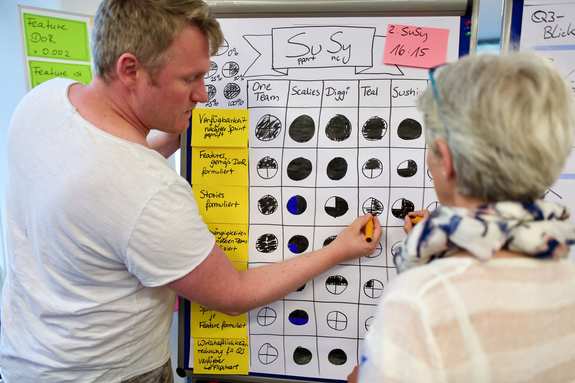
Four configurations of SAFe for your use case
There are four configurations of SAFe that are tailored to the size, complexity and specific needs of an organization. Each of these configurations offers a scalable solution for the introduction of agile methods and practices:
- Essential SAFe
- Large Solution SAFe
- Portfolio SAFe
- Full SAFe
We briefly present the two most important ones. In practical implementation, however, there are other forms that can be individually adapted to the challenges of an organization.
Essential SAFe
Essential SAFe is ideal for organizations that are just starting to scale agile methods. It comprises the "team" and "program" levels. In SAFe, the teams organize themselves using Scrum and/or Kanban. The teams work together in an agile program - the Agile Release Train (ART). An ART consists of 50 - 125 team members in 5-12 teams. These are responsible for the entire development and value creation of a definable product. The teams work in iterations, with SAFe recommending a length of two weeks per iteration;
The entire ART has a cycle of four to six iterations, i.e. 8 - 12 weeks, which result in a Planning Interval (PI). The PI is the core of SAFe and PI planning is the central event for the start of a PI cycle. During PI planning, all members of the ART come together to synchronize and plan together.
At the ART level, there is Product Management (PM). This is the counterpart to the Product Owners at team level. Product management is responsible, among other things, for ensuring that the right things are being worked on. It coordinates with the product owners and architects on which features are to be implemented next. Product Management shares the ART's implementation capacity with the architects, who define architecture features to maintain and expand the ART's technical capabilities.
Cooperation in the ART is supported by the Release Train Engineer promoted. For the ART level, this is the counterpart to the Scrum Master at team level.
Full SAFe
The most comprehensive configuration is Full SAFe. It is ideal for organizations looking for a comprehensive solution to implement and manage agile processes on a broad scale, especially when it comes to managing the development and delivery of large, complex solutions.
Full SAFe includes all levels and components of SAFe: Team, ART, Large Solution and Portfolio. It describes agile working for large, complex organizations and also takes strategic planning and financing into account. The aim of Full SAFe is - based on the successful model of an ART - to provide agile patterns for companies or institutions.
The Large Solution level combines several ARTs into a single unit. In this way, several hundred people can work on an integrated result. At the portfolio level, a portfolio is derived from the strategic topics, which is used in an extensive Kanban process to initiate and finance the implementation of large orders (epics). The epics in turn are implemented by programs (or large programs).
Full SAFe ensures that all levels of the company, from the teams to the portfolio, work towards common goals.
SAFe Implementation Roadmap: sustainable introduction of SAFe
The roadmap consists of 12 consecutive steps and contains important change principles, among other things. At the beginning of the decision for SAFe is an attractive vision or an urgent need to create the initial momentum for the change. This is followed by the introduction of the first ART. Once the first ART has been successfully launched, further ARTs can be gradually implemented, the large solution if required and finally the portfolio level. Full SAFe - the agile organization - is then implemented. A coalition of SAFe-qualified supporters, the Lean-Agile Change Agents, serve as supporters and multipliers throughout the entire process. In keeping with the agile idea, this process is never complete, which is why SAFe calls it "relentless improvement".
We support you in the systematic introduction of scaled agile using the Scaled Agile Framework.
Yes, by integrating the agile frameworks and addressing an entire agile organization, the picture of the Scaled Agile Framework is complex.
But that's also being somewhat honest: the agile organization is complex. An Agile Transformation requires patience. The trick is to cut out the part that is relevant to the organization at the moment and reduce the picture to these elements . We support you in finding this beginning. As a Gold Partner of Scaled Agile, we offer you a broad portfolio of workshops, trainings and support options for SAFe. We will not try to implement models dogmatically, but will work with you to find your individual solution using models and patterns.
The special thing about wibas is the pragmatism, which is especially necessary for such a comprehensive framework. And of course our years of experience in organizational development, which allows us to work not only with models, but also with people. Please feel free to call us and arrange a personal meeting. We look forward to thinking with you.
Our SAFe® consulting services for you
Our experienced consultants will support you in the customized implementation of the Scaled Agile Framework in your organization.
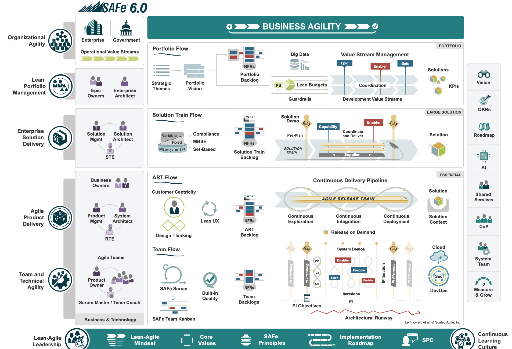
Customized introduction to SAFe®
We offer you an individual introduction to SAFe and Scaled Agile. The focus is on your specific questions and requirements to identify the elements of the Scaled Agile Framework that are relevant to your organization. In a preliminary discussion, we discuss your requirements and based on this we create a program that is precisely tailored to your needs.
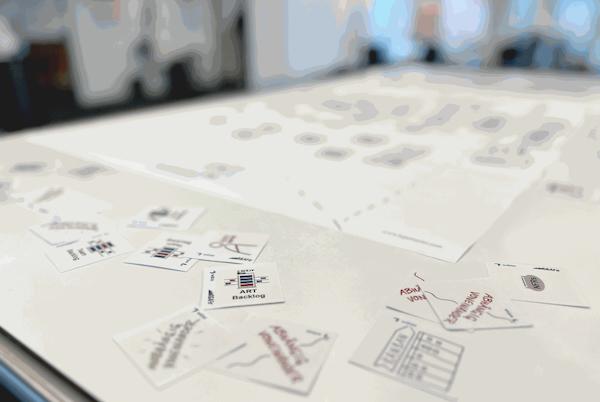
SAFe® Value Stream Workshop
We design a workshop in which we look at the value streams in your company - and possible future steps. The aim is to eliminate dependencies and obstacles in your day-to-day work. With this workshop, you ensure a targeted, agile work organization for your employees along the value chain.
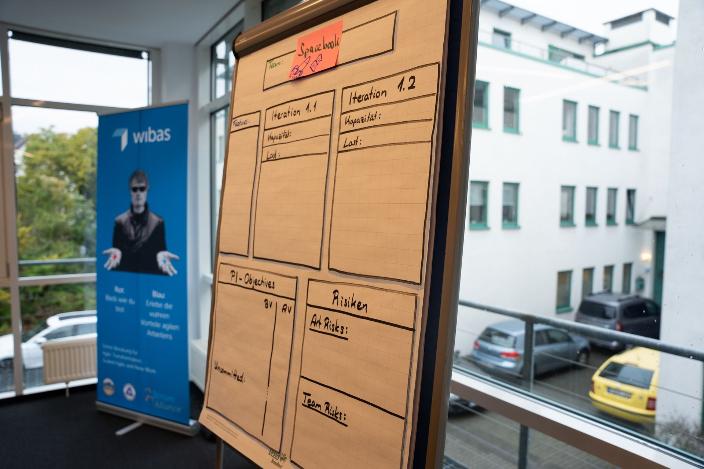
ART launch and first PI planning
Together we organize and conduct a series of Agile Release Train (ART) launch workshops. In these workshops, we plan the ART launch and the team composition. We also create the vision, an initial roadmap and backlogs, and we set up a Kanban board together. Last but not least, we set up the necessary tools and documentation approaches
(e.g. in JIRA or Confluence).
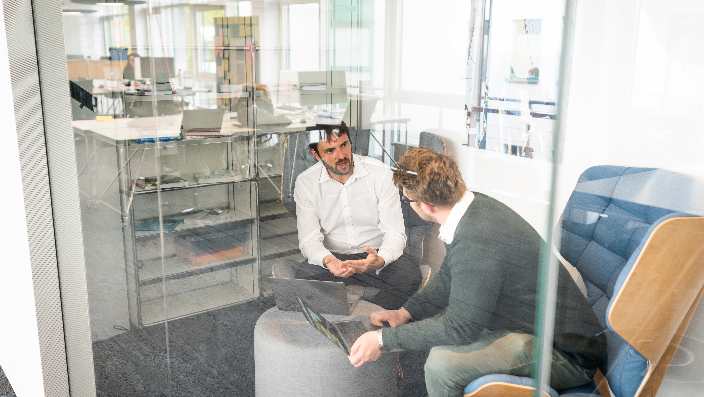
Maximize added value with the help of ART Coaching
Our coaching at ART and team level accompanies your key roles such as Product Management, System Architect, Product Owner, Release Train Engineer and Scrum Master so that they find their way efficiently and confidently into their roles. We also provide support at team level, e.g. as interim Scrum Masters or Scrum/Kanban coaches.

Setting up lean portfolio management
We support you in the introduction of SAFe-compliant lean portfolio management, which optimizes the strategic alignment, budgeting, coordination and control of your value streams. Our consulting supports you in setting up efficient and fast portfolio processes that increase your responsiveness to market changes.
Get in touch with Malte Foegen, our SAFe expert. Together with you, he will lay the foundation for the start of SAFe in your organization.
Introduction to SAFe
Would you like to understand the Scaled Agile Framework (SAFe) and assess its benefits for your organization? Would you like to know how a SAFe implementation fits your needs? Then you've come to the right place!
SAFe 6.0 Trainings with wibas
Whether Leading SAFe 6.0 or Implementing SAFe 6.0, we offer the full range of Scaled Agile Academy training courses.
ART Launch and first PI Planning
A successful start to your Agile Release Train (ART) is crucial for the success of your agile transformation. We support you in the preparation of such an ART right through to the launch.
Agile Transformation
What is an agile transformation? Requirements ✓ Procedure ✓ Success factors ✓ Transformation coaches ✓ Roadmap ► Learn more now!
Introduction of SAFe at SMA
Find out here what positive effects the introduction of SAFe has had at the medium-sized energy company SMA.
Objectives & Key Results
OKR (Objectives and Key Results) is an agile framework for management with objectives and measurable performance indicators. It creates a framework that enables employees to act autonomously towards common goals.
Large Scale Scrum (LeSS)
Large Scale Scrum (LeSS) offers a consistent agile solution for working on a product together with several Scrum teams.
Your expert for the Scaled Agile Framework:
Malte Foegen
